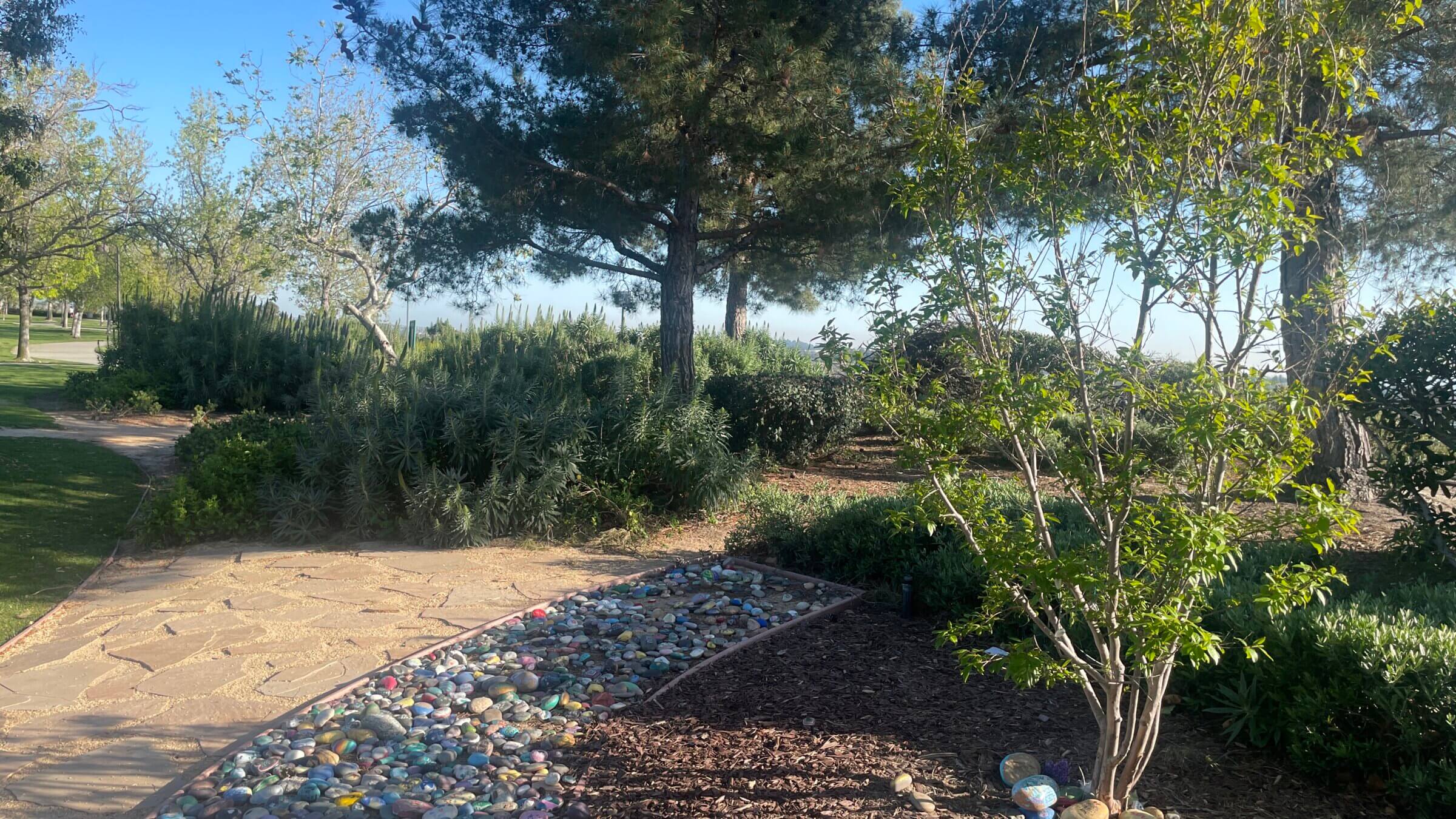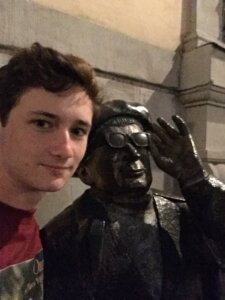Killer of slain Jewish college student says victim threatened to out him
In testimony, Samuel Woodward says he was enraged and terrified when he stabbed Blaze Bernstein to death

Painted rocks decorate a memorial for Blaze Bernstein at Borrego Park in Lake Forest, California. On June 20, Samuel Woodward described killing and burying Bernstein in the park. Photo by Louis Keene
Testifying for the first time about the night he stabbed Blaze Bernstein to death, Samuel Woodward said Thursday the event that provoked him was thinking that Bernstein had taken a photo of his penis while Woodward was blacked out from smoking a joint — and either planned to share it or already had.
Striking a disheveled, nearly catatonic figure on the witness stand and speaking in a quiet monotone, Woodward, 26, told the jury — gradually, in responses marked by long pauses — that when he emerged from his blackout, his former high school classmate was holding a cell phone in one hand and Woodward’s penis in the other.
“I was just in mortal terror,” Woodward said.
He said he asked Bernstein in a panic what he was doing, and Bernstein replied tauntingly, something like, “I got you, you fucking hypocrite.”
Woodward said he then tried unsuccessfully to grab the phone from Bernstein.
“At that point I just — the phone wasn’t even in the way anymore,” Woodward said, his head and eyes lowered as it had been throughout his testimony. “Nothing was in the way anymore. It just kept — I just kept driving and driving and driving the knife down.”
Prosecutors say the killing of Bernstein, then a 19-year-old Jewish college student, on the night of Jan. 2, 2018, was a premeditated anti-gay hate crime. Woodward’s attorney had conceded during opening statements — back in April — that his client, a member of a neo-Nazi group, killed Bernstein, but that he was motivated by something that Bernstein did or said that night.
For the last six-and-a-half years, what a defense would claim was Woodward’s motivation has been the central question looming over the trial. The revelation in April that Bernstein had confessed to his best friend that he had done “something really horrible” — possibly only minutes before his death — added to the mystery.
On Thursday, before a mostly full courtroom that included both Bernstein parents and many of their friends, Woodward finally delivered an answer. But coming at the end of four days of testimony that at times tested the limits of plausibility — and considering the jury has already heard a recording of Woodward lying to Bernstein’s parents about their son’s whereabouts — his story may not find much purchase with the jury.
In previous days on the stand Woodward had denied or failed to recall many of the details of the case that his parents, former classmates and investigators had corroborated over the previous 12 weeks.
He said nude pictures he had sent were ones he had found online — even as the tiles in the background matched his dorm room bathroom.
Some of his writings — including personal, self-flagellating ones — he said he had copy pasted from the internet.
He said he did not remember American Vanguard, the neo-Nazi group investigators said Woodward hung around prior to joining its more violent offshoot, Atomwaffen Division.

And he said he never wondered if he was gay. The gay porn websites an investigator found in his browser history Woodward said he had visited only for the purpose of Photoshop pranks on internet friends.
Ken Morrison, Woodward’s attorney, received what seemed like little cooperation from his witness. Woodward paused frequently before he spoke, sometimes for as long as 30 seconds. Morrison, who is the third public defender to take Woodward’s case, asked his client several times each day to lift his head, move the shoulder-length hair out of his eyes and look up. Woodward rarely did.
Before he asked about the events of that night, Morrison guided Woodward through an outline of the defense, beginning with his membership in Atomwaffen, a now defunct group whose members have been linked to several violent incidents.
When Morrison asked him if he ever felt attached to Atomwaffen ideas, Woodward said he didn’t recall. Instead, he said, he had joined Atomwaffen because it offered him the chance to be a part of something meaningful, just like “men riding motorbikes, men playing sports together, men who just set examples for each other and show each other how to elevate each other to the greatest heights they can possibly be.”
The prosecution has previously stated that Woodward had written an Atomwaffen membership test based on the fascist handbook Siege. But on Wednesday Woodward said he had only read parts of it, and only vaguely remembered it.
Perhaps in an effort to confront the strangeness of his client’s testimony head-on, Morrison on Thursday began by cycling through Woodward’s earlier answers, asking him if they were still his answers — they were — and then asking him point blank: “Are you lying about that?”
“No, I’m not,” was Woodward’s repeated reply.
When Morrison’s questioning turned to Bernstein, Woodward said that after matching on Tinder that night, they moved to Snapchat at Woodward’s request. Woodward said that on Snapchat — where messages disappear after a user closes the chat window — he suggested that he and Bernstein hang out sometime, at which point Bernstein told him he was free now and he should come over. Then Bernstein shared his home address.
Woodward said he threw some food and drinks into his rental car — a sleeping bag that contained smoking paraphernalia was already inside — and drove from his house in Newport Beach to the Bernstein home in Foothill Ranch. From there, he said, Bernstein directed him to nearby Borrego Park. Security camera footage played earlier in the trial showed the car stopping in the parking lot, then the two walking into the park, later returning to the car and driving out of the parking lot.
Woodward said Wednesday that they were relocating to find a more secluded spot to smoke in. Eventually they found a different spot in the park — Woodward said it was by a bench, but he was unable to pinpoint a rough location on a map — where Woodward said he pulled out the marijuana, used a pocket knife he habitually carried around to open the container, and rolled a joint.
After just a couple of puffs, Woodward said, he got so high that he zoned out completely lying on the ground. He said he felt Bernstein get near the sleeping bag, but Woodward was already nodding off.

Some time later, he said, he awoke to a kind of sensation on his legs, which at first he thought was a result of accidentally urinating as he had done in the past, he said. Then, he said, “I saw a hand right on my crotch with my pants unbuckled and he had me” — meaning, Woodward’s penis, “in his hand.” In the other hand, Woodward said, was his phone.
“When I looked at him and saw the light of the phone, I realized what he had in his hand,” Woodward said. “I just came undone. I went into a state of terror and I asked, ‘What are you doing? What are you doing?’” Bernstein’s response, he said at first, was, “Calm down, it’s not a big deal.”
Later, Woodward said Bernstein might also have said the word “outed.”
He believed Bernstein had taken photos and was spreading them, which he said terrified him, especially because his family, and his dad in particular, opposed homosexuality. After wrestling for control of the phone, he pulled out the pocket knife and began stabbing Bernstein. Then he destroyed the phone.
In that moment, he said, he felt “anger like nothing I’d ever felt in my whole life.”
His description of the killing left some in attendance in audible shock. Some could be heard crying, and as Woodward proceeded to describe his efforts to bury the body by hand, Bernstein’s mother, Jeanne Pepper, walked out of the courtroom.
Morrison closed by asking Woodward whether he hated Bernstein either because he was gay or because he was Jewish.
“No, not at all,” he said.
With about half an hour remaining in the day, lead prosecutor Jennifer Walker began her cross examination. She led by getting Woodward to admit that he had created an account on the gay dating app Grindr whose bio read, “All fags and fakers are in for it, get ready to die.”
Walker will continue cross-examination on Monday.















